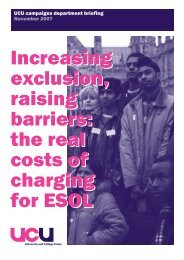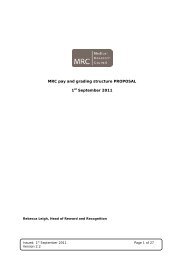Disability Equality Duty - UCU
Disability Equality Duty - UCU
Disability Equality Duty - UCU
Create successful ePaper yourself
Turn your PDF publications into a flip-book with our unique Google optimized e-Paper software.
<strong>Disability</strong> <strong>Equality</strong> <strong>Duty</strong><br />
The 2005 <strong>Disability</strong> Discrimination Act proposes several changes to existing disability<br />
equality law. These come into effect on 5 December 2006. All public sector bodies<br />
(including colleges and universities) will now be subject to a general duty to promote<br />
equality between disabled and non-disabled people. This is similar to the duty to promote<br />
race equality under the Race Relations (Amendment) Act. This is a positive duty which<br />
builds in disability equality at the beginning of the process rather than make adjustments<br />
at the end after disabled people have complained about discrimination. Universities and<br />
colleges will also be subject to a number of specific duties.<br />
Summary of the general duty<br />
The basic requirement for a public authority when carrying out their functions is to have<br />
due regard to:<br />
• promote equality of opportunity between disabled people and other people<br />
• eliminate discrimination that is unlawful under the <strong>Disability</strong> Discrimination Act<br />
• eliminate harassment of disabled people that is related to their disability<br />
• promote positive attitudes towards disabled people<br />
• encourage participation by disabled people in public life<br />
• take steps to meet disabled peoples needs, even if this requires more favourable<br />
treatment<br />
Specific duties<br />
A number of specific duties will also come into effect:<br />
• Public sector bodies (including universities and colleges) will be required to write<br />
and publish disability equality schemes<br />
• Institutions must collect and analyse data on disabled staff and students<br />
<strong>UCU</strong> guidance – <strong>Disability</strong> <strong>Equality</strong> <strong>Duty</strong> 1
• Institutions will be obliged to reflect on the outcomes of monitoring, and publish a<br />
disability equality scheme, setting out what they will do to promote disability<br />
equality<br />
• Institutions will have a duty to monitor the effectiveness of the scheme<br />
• Institutions will be obliged to carry out a disability impact assessment: this means<br />
that they will have a duty to look at the effectiveness of current and proposed<br />
policies and disability equality schemes and assess their likely effectiveness in<br />
terms of creating equality between disabled and non-disabled staff, and disabled<br />
and non-disabled students<br />
All the specific duties set out in the Act are also subject to one further and defining<br />
obligation:<br />
• The institution has a duty to actively involve disabled people and the Code of<br />
Practice recommends involving staff unions in the implementation of the Act<br />
“Involvement” requires active engagement of disabled stakeholders, not simply<br />
“consultation”. Disabled people need to be involved in identifying barriers faced by<br />
disabled people, setting priorities for action plans and assisting planning activity.<br />
This duty to involve is stronger than the equivalent duties in other anti-discrimination<br />
legislation, including the Race Relations Amendment Act) where the requirement is to<br />
consult.<br />
The <strong>Disability</strong> <strong>Equality</strong> Scheme and Action Plan<br />
The purpose of the <strong>Disability</strong> <strong>Equality</strong> Scheme is to demonstrate how public bodies intend<br />
to fulfil both their general and specific duties. All universities and colleges must have<br />
produced their <strong>Disability</strong> <strong>Equality</strong> Scheme by 4 December 2006. The essential elements<br />
that the <strong>Disability</strong> <strong>Equality</strong> Scheme must include are:<br />
• a statement of how disabled people have been involved in developing the scheme<br />
• the action plan<br />
• arrangements for gathering information about performance of the public body on<br />
disability equality<br />
• arrangements for assessing the impact of the activities of the authority on disability<br />
equality and improving these when necessary<br />
• details of how the authority is going to use the information gathered, in particular in<br />
reviewing the effectiveness of its action plan and preparing subsequent schemes.<br />
Institutions will have to report on progress on an annual basis.<br />
<strong>UCU</strong> guidance – <strong>Disability</strong> <strong>Equality</strong> <strong>Duty</strong> 2
Key dates<br />
By 4 December 2006 all universities and colleges must produce and publish their<br />
<strong>Disability</strong> <strong>Equality</strong> Scheme.<br />
Involving disabled people<br />
At the heart of the <strong>Disability</strong> <strong>Equality</strong> <strong>Duty</strong> is the requirement to involve disabled people in<br />
producing the <strong>Disability</strong> <strong>Equality</strong> Scheme including the action plan. Involving disabled<br />
people is not only a requirement of the duty but it should bring tremendous benefit in<br />
terms of expertise to the institution. Involvement should not be confused with<br />
consultation. This duty requires a very active engagement of disabled stakeholders at all<br />
stages, not simply consultation.<br />
There will be a wide variety of ways of involving disabled people. These could include<br />
through:<br />
• existing forums, such as disabled staff networks<br />
• setting up specialist forums of disabled people (where none exist at present)<br />
• workplace trade unions<br />
• segmenting and developing existing consultation mechanisms or utilising existing<br />
networks.<br />
How will the <strong>Duty</strong> be enforced<br />
In relation to the specific duty and those bodies who will have to produce a <strong>Disability</strong><br />
<strong>Equality</strong> Scheme, the DRC (<strong>Disability</strong> Rights Commission) will have the power to issue<br />
compliance notices where it is satisfied that a public authority has failed to comply with its<br />
specific duties under the regulations, and can enforce the notices in the county or sheriff<br />
court. In terms of the general duty any person, including the DRC, can apply to the High<br />
Court or Court of Session of a public body they thought was failing to comply.<br />
Checklist for branches/local associations<br />
• Use the introduction of the DED as part of your bargaining agenda – think about<br />
how to use the general and specific duties in any relevant casework and<br />
negotiations you are involved in<br />
• Build disability equality into the way you organise – you will find that disabled<br />
members may want to get involved and active in this area of work<br />
• Encourage disabled members to join self organised groups and networks – at<br />
local, regional and national level – contact AUT and NATFHE for more information<br />
about how to do this<br />
• Encourage your employer to actively involve a wide range of disabled people in its<br />
work in this area<br />
<strong>UCU</strong> guidance – <strong>Disability</strong> <strong>Equality</strong> <strong>Duty</strong> 3
• Press your employer to understand and adopt the social model of disability - The<br />
Social Model changes the focus away from people's impairments and towards<br />
removing the barriers that disabled people face in every day life: it is not the<br />
impairment that is the problem, or the disabled person, rather it is society's failure<br />
to take into account our diverse needs<br />
• Press your employer to run <strong>Disability</strong> <strong>Equality</strong> Training for all staff<br />
• Get involved now in the development of the <strong>Disability</strong> <strong>Equality</strong> Scheme – put the<br />
<strong>Disability</strong> <strong>Equality</strong> <strong>Duty</strong> on the agenda of your next <strong>Equality</strong> Committee or Joint<br />
Negotiating meeting with your employer. Find out what has been done to date.<br />
Ensure there is trade union representation on the Group tasked with producing the<br />
scheme. Ensure the Group is actively involving disabled people in its work. Send<br />
completed schemes to AUT or NATFHE (or <strong>UCU</strong>)<br />
• From 5 December 2006 monitor the <strong>Disability</strong> <strong>Equality</strong> Scheme and associated<br />
Action Plan<br />
• Tell members about disability equality and the new <strong>Disability</strong> <strong>Equality</strong> <strong>Duty</strong> and let<br />
them know about the work you are doing in this area<br />
Questions to ask:<br />
1. Does your institution have an <strong>Equality</strong> Committee / Forum with trade union<br />
representation<br />
2. Does your institution have a disabled staff group<br />
3. Is there a disability policy<br />
4. Was it negotiated with the union<br />
5. Were disabled members of staff actively involved in writing it<br />
6. Has the disability policy been updated to take into account the <strong>Disability</strong><br />
Discrimination Act 2005<br />
7. Do all members of staff have copies of the policy<br />
8. Has your institution begun to collect and analyse evidence on disability and the<br />
promotion of disability equality<br />
9. Has the institution set targets for recruitment where the staff population is underrepresentative<br />
of key groups<br />
10. Have members of staff been invited to contribute to a public discussion on what<br />
the general duty to promote equality between disabled and non-disabled people<br />
means for all areas of the institution's work: including budgeting, work with<br />
contractors, maintenance of buildings, curriculum …<br />
<strong>UCU</strong> guidance – <strong>Disability</strong> <strong>Equality</strong> <strong>Duty</strong> 4
11. Have groups of disabled staff been actively involved in assessing the institution's<br />
general progress towards achieving equality between disabled and non-disabled<br />
people<br />
12. Have groups of disabled staff been specifically consulted on key institutional<br />
policies and practices, which are likely to have a significant impact on disabled<br />
staff<br />
13. Have all staff received training in work time on the implementation of the Act<br />
If the answer to questions 3, 5, 6, 8, 9 or 12 is no, your employer may be breaking the<br />
law.<br />
Further information<br />
<strong>Disability</strong> Rights Commission<br />
http://www.drc-gb.org<br />
http://www.drc.org.uk/businessandservices/publicsectordutycodes.asp<br />
http://www.drc-gb.org/documents/dda_2005.doc<br />
Department for Work and Pensions<br />
http://www.dwp.gov.uk/aboutus/dda_2005.asp<br />
TUC – Advice for unions on the 2006 Public Sector <strong>Disability</strong> <strong>Equality</strong> <strong>Duty</strong><br />
http://www.tuc.org.uk/equality/tuc-11323-f0.cfm<br />
<strong>Equality</strong> Challenge Unit – <strong>Disability</strong> guidance<br />
http://www.ecu.ac.uk/guidance/disability/guidance.htm<br />
<strong>UCU</strong><br />
http://www.ucu.org.uk<br />
Charlotte Nielsen: cnielsen@ucu.org.uk<br />
Kate Heasman: kheasman@ucu.org.uk<br />
<strong>UCU</strong> guidance – <strong>Disability</strong> <strong>Equality</strong> <strong>Duty</strong> 5


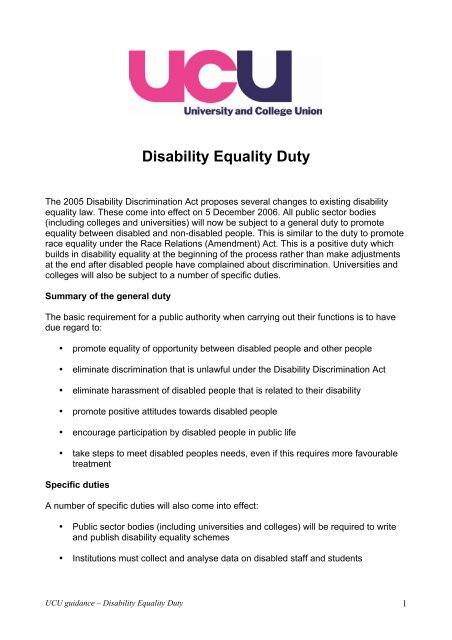

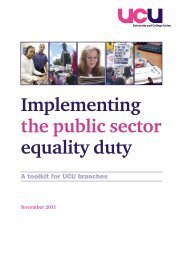
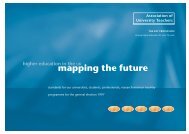
![(.pdf) [29kb] - UCU](https://img.yumpu.com/50914942/1/184x260/pdf-29kb-ucu.jpg?quality=85)


